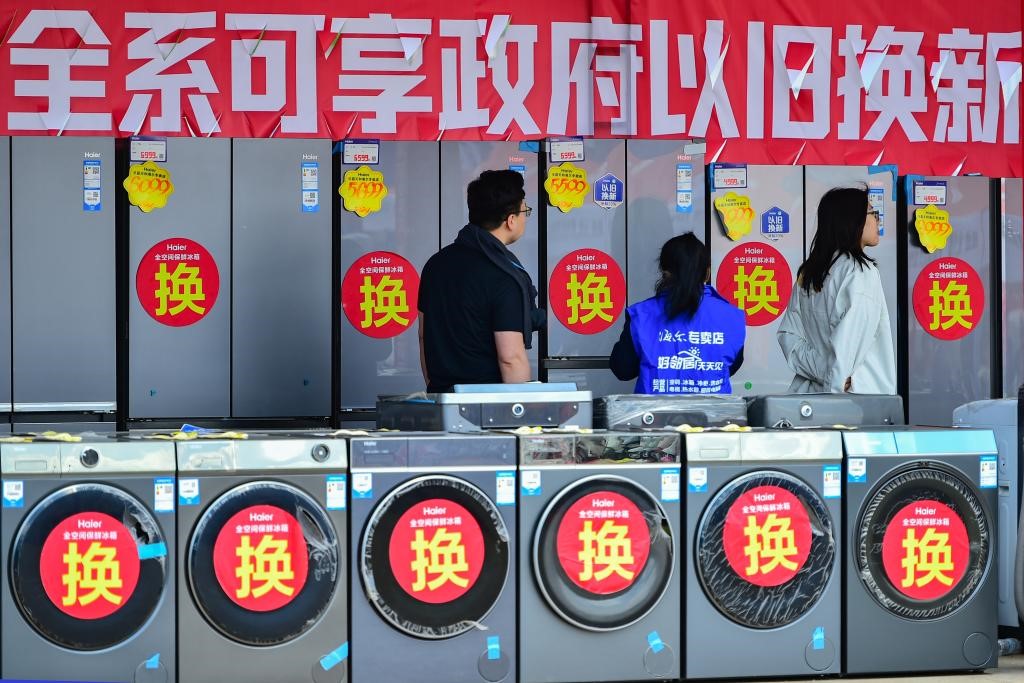Tech stimulates consumption vitality in China


A recent report by the China National Commercial Information Center on China's consumer goods market shows that the policy of trading old consumer goods for new ones has significantly boosted home appliance sales and accelerated the market's shift toward intelligent and green appliances. With the continuous upgrading of technologies such as the internet of things and artificial intelligence, the intelligence of home appliances is no longer limited to the improvement of single-product functions but is moving toward whole-house intelligence and scene linkage. Many home appliance enterprises are exploring the deep integration of AI large models in home appliances, paying more attention to the naturalness of human-computer interaction, the precision of personalized services, and the intelligent coordination of home ecosystems, constantly creating new scenarios and optimizing the consumption experience.
With the help of technological means, cultural and tourism services have been "upgraded" in various ways, continuously expanding new consumption scenarios and releasing new consumption momentum. In Central China's Henan province, the Mangdang Mountain Tourist Area has achieved double growth in passenger flow and consumption through intelligent services and immersive culture experiences, further unleashing the potential of cultural and tourism consumption. "I think this intelligent system is very convenient. I can check the real-time situation of the scenic area on my phone before coming and arrange my itinerary in advance, avoiding a lot of trouble," said tourist Pang Longlong. According to Luo Shuai, deputy general manager of Henan Mount Mangdang Tourist Area, through the smart tourism system, staff members can understand tourists' needs more accurately and optimize service content and product supply.
"For example, adjusting the performance schedule and frequency reasonably based on tourist flow and preferences, and increasing the stock of popular cultural and creative products." Luo Shuai said that in the future, tech will further improve the construction of smart tourism to bring a better tourism experience to visitors. In the Kaifengfu Scenic Area in Henan, tourists can incarnate as "Song Dynasty officials" to interact with Bao Zheng, a famous judge in the Song Dynasty (960-1279) and solve mysteries in a large-scale holographic immersive interactive drama that relies on holographic three-dimensional imaging, naked-eye 3D (autostereoscopic 3D) visual effects, and virtual reality interaction technology.
In Xi'an, Northwest China's Shaanxi province, the large-scale water dance light show Dreaming of the Tang Dynasty (618-907) uses stage sound, light and electricity technology to let poet Li Bai in his old, middle, and young ages appear on the same stage. In Zibo, East China's Shandong province, the Liaozhai City Scenic Area in Zichuan district has introduced AI, VR, and other technologies to create immersive performing arts projects with the theme of Liaozhai, an ancient ghost stories book, allowing tourists to personally experience author Pu Songling's ghost stories.
New technologies also create new service consumption scenarios, making orders convenient with one click from the mountain top over 800 meters above sea level, with efficient takeout deliveries from the foot of the mountain in about 10 minutes. The drone food delivery service allows tourists to have a different experience while enjoying the scenery. As a new order is received, a coffee shop in Shengtangwan, Baizhang township, Yuhang district of Hangzhou, East China's Zhejiang province, braces for a busy period. Soon after, a staff takes the packaged coffee order to the drone station, inputs the command, and watches the drone take off with the order through the misty valley along the preset route, landing steadily on top of the platform, more than 800 meters above sea level, 10 minutes later.
Chen Yang, an operation engineer said it initially took an hour and a half to go back and forth. With this route, customers can get their takeout within 20 minutes of placing their order through the app. With the continuous integration of aviation technology, the digital economy, and consumption scenarios, the low-altitude economy has opened up a trillion-yuan consumption space. At the same time, technology is further empowering the "silver economy".
Recently, the International Electrotechnical Commission (IEC) officially released an international standard for elderly care robots led by China, which is leading the healthy development of the global elderly care robot industry. A series of intelligent products such as elderly care companion robots and AI face diagnosis robots have been launched, providing diversified services for the elderly and highlighting the broad application prospects of intelligent technology in the elderly care field.
Through the empowerment of technology, the supply of consumer products is continuously optimized, application scenarios are deeply expanded and business formats are enriched, fostering the continuous release of economic vitality.




































